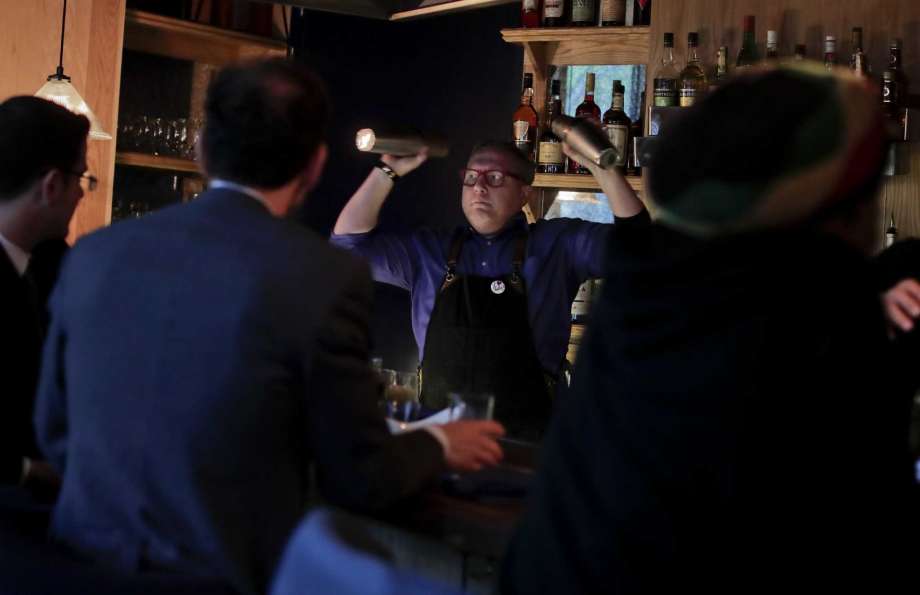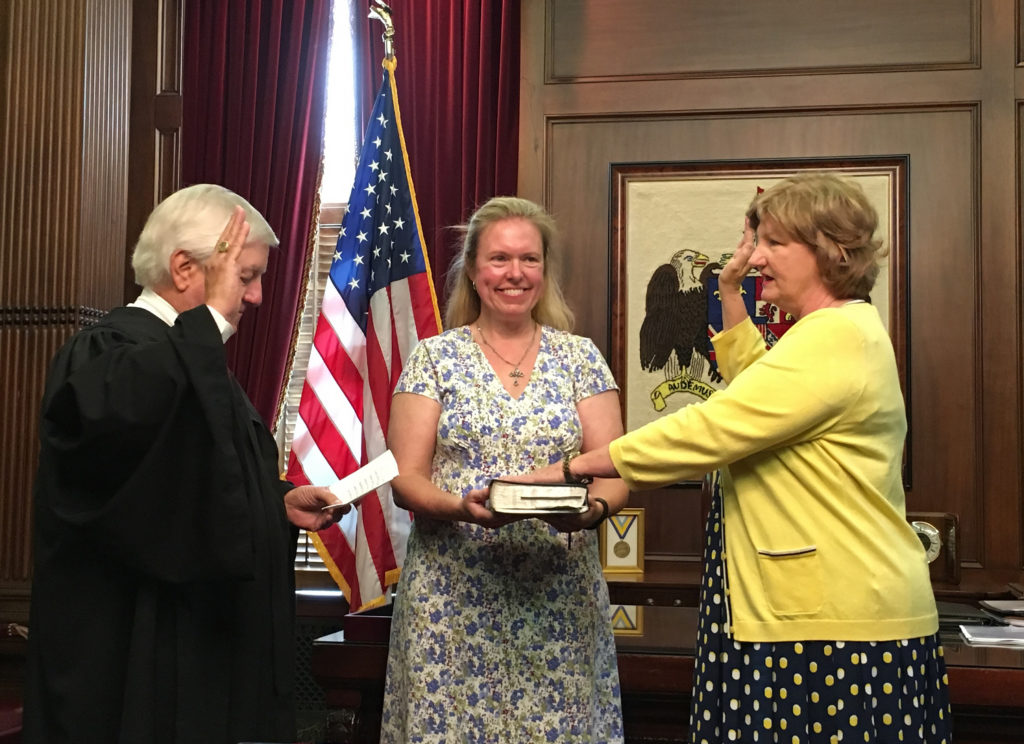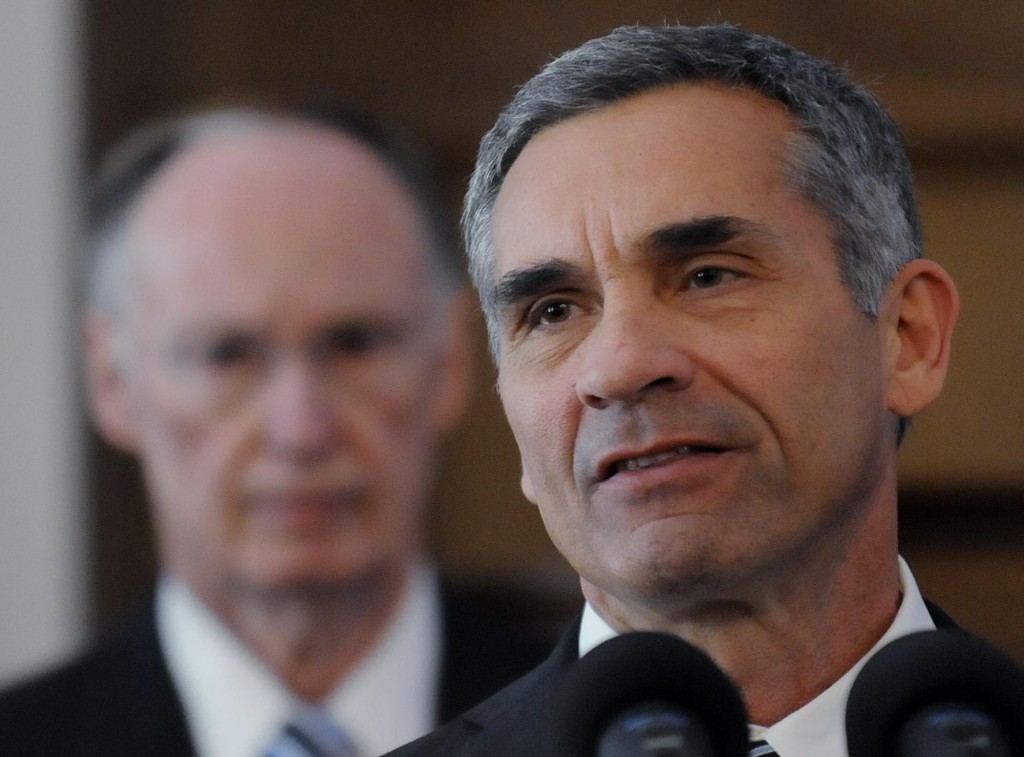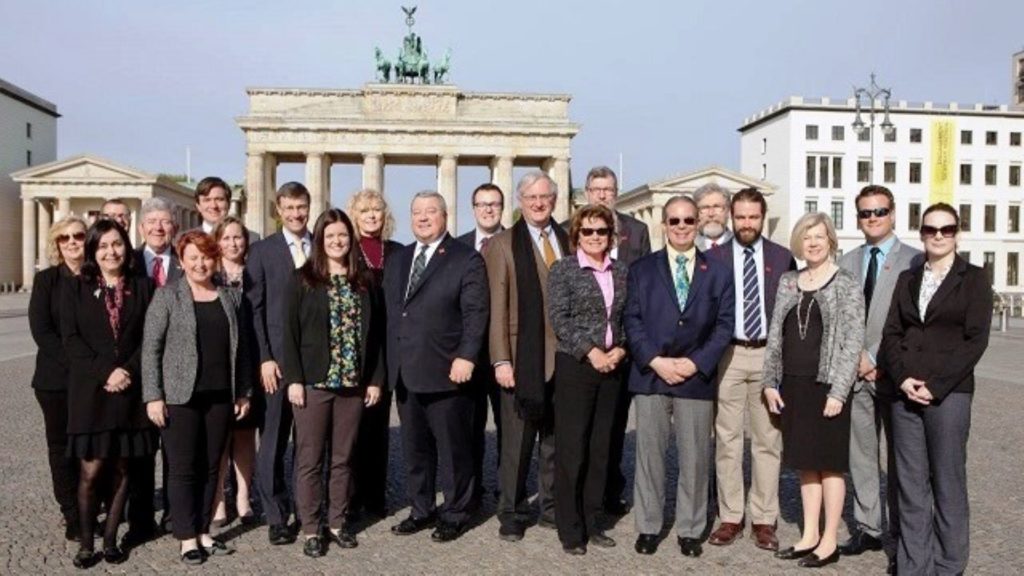Anti-Donald Trump bar earmarks its profits for progressive causes

Liberals who feel the current Republican presidential administration is driving them to drink now have the perfect place to do it. A new bar, Coup, opened this month with protest-themed decor, a distinctly anti-President Donald Trump vibe and a promise by its owners to donate their profits to organizations including the American Civil Liberties Union and Planned Parenthood. Patrons are offered a chance to earmark where their money goes. When they buy a drink, they get a token to drop into one of a half-dozen jars, each labeled with the name of a nonprofit group. The list of recipients will rotate. Jars on tap this week included the Natural Resources Defense Council and Human Rights Watch. Tokens also are on sale for $5. After labor costs, liquor bills and other expenses are paid, the profits are divided among the groups based on the number of tokens they receive. The bar was the brainchild of partners Ravi DeRossi, Sother Teague and Max Green. It’s housed in a small Manhattan space where DeRossi used to have a restaurant. The decor is modern protest. Rolls of butcher paper have been attached to the walls, inscribed with slogans like “The Pilgrims were undocumented” and “They tried to bury us. They didn’t know we were seeds.” DeRossi, who owns several bars, said he was depressed by the election, which sent him into a dark mood for several weeks. “I couldn’t sit at home and sulk,” he said. “I wanted to do something more positive.” The bar’s name, Coup, is a reference to a sudden seizure of power from the government, rather than a house for chickens. DeRossi and Teague said it was the only name they all agreed on after starting out considering slightly less aggressive monikers. DeRossi said he wasn’t worried about backlash or bad reaction from Trump supporters. “We’re in New York City, where 90 percent voted essentially for this bar,” he said. All are welcome, he added. “If people want to come in that are Trump supporters, they’re more than welcome to come in and have a drink,” he said. “They’ll be treated with respect as long as they treat us with respect, and knowing that their money is going to these specific organizations.” Trump has promised to “make America great again.” He has pushed to deport immigrants who are in the United States illegally, saying he wants to make the country safe, and he has said he’s working to reform the tax code to lighten Americans’ financial burdens, ignite economic growth and simplify tax filing. For people looking to make less political donations at the bar, they could drop a token in a jar for the American Society for the Prevention of Cruelty to Animals. Choosing to drink at Coup “makes you feel like you’re doing something,” said Matthew Hayes, an attorney who was there with two friends. “Instead of just getting sotted, you can also throw something to a good cause.” He said it was also an opportunity to interact with strangers over topics like politics that people might avoid in other social settings. “By putting yourself in a situation like this where it is a politically themed bar,” he said, “that kind of takes politics off the Don’t Talk About table.” Republished with permission of the Associated Press.
Donald Trump tax cut: Huge, vague and likely mild boost for economy

President Donald Trump‘s team boasted Wednesday that its tax-cut plan would lighten Americans’ financial burdens, ignite economic growth and vastly simplify tax filing. Yet the proposal so far remains short of vital details, including how it would be paid for. And based on the few specifics spelled out so far, most experts suggest that it would add little to growth while swelling the budget deficit and potentially handing large windfalls to wealthier taxpayers. Trump’s plan would replace the current seven income tax brackets with three, and the top bracket would drop from 39.6 percent to 35 percent. It would also slash the corporate rate from 35 percent all the way to 15 percent, a boon to most companies even though many don’t pay the full tax now. With tax credits and other loopholes, most corporations pay closer to 20 percent, according to calculations by JPMorgan. Perhaps the most contentious plank would enable taxpayers with business income — including those wealthy enough to pay the top tax rate — to instead pay the new 15 percent corporate rate. That’s because Trump would apply the corporate rate to “pass through” businesses. Pass-throughs include partnerships such as law firms and hedge funds as well as most small businesses — from the local florist to the family-owned restaurant on Main Street. What’s more, some privately held large companies — including Trump’s own real estate empire — are structured as pass-throughs and would benefit, too. Here’s a closer look at Trump’s proposal and its likely impact: ___ WHO BENEFITS? It’s hard to say because the administration has released so few details. The three new income tax rates would be 10 percent, 25 percent and 35 percent. But Trump’s top economic adviser, Gary Cohn, and Treasury Secretary Steven Mnuchin, weren’t ready Wednesday to say at what income levels these new rates would kick in. Tax experts said far more details were needed to determine how average Americans would be affected. “The impact on Joe Taxpayer is unknown,” said Marc Gerson, vice chair of the tax department of law firm Miller & Chevalier in Washington. “There’s not enough specificity. It’s hard for taxpayers to determine where they’ll come out.” Cohn asserted that the plan would cut taxes “especially for low and middle income families.” It purports to do so in part by doubling the standard deduction, which is used by taxpayers who don’t itemize their tax deductions. At the same time, the Trump plan would eliminate the estate tax and the alternative minimum tax, thereby benefiting some of the richest taxpayers. And that’s on top of shrinking the corporate tax rate that many affluent individuals could likely capitalize on. ___ WHY CUT CORPORATE TAXES? By making corporations more profitable, the Trump administration hopes to encourage more business spending on equipment — from computers to factories and machinery. Doing so, in turn, could make the economy more efficient and accelerate growth and hiring. Economic growth has been stuck at about 2 percent a year since the recession ended in 2009. Mnuchin says the administration wants to accelerate it above 3 percent, a pace it hasn’t touched since 2005. The corporate tax cuts are also intended to encourage more businesses to stay in the United States, which now has the highest corporate rate among advanced economies. Many large corporations are enthusiastic about lower rates and say they support the elimination of loopholes, which both reduce revenue and make taxes more complicated. ___ WHO’D BENEFIT FROM THE CORPORATE RATE CUT? Aside from most large companies, many partnerships and small businesses would benefit because they’re structured as pass-throughs, which derives from the fact that they pass on their profits to their owners. Those owners now pay individual income tax rates, which top out at 39.6 percent. With the pass-through rate dropped to 15 percent, those taxpayers could enjoy an enormous tax cut. The Trump team stressed the benefits that might flow to small businesses. But the richest windfalls would flow to the wealthy — lawyers, hedge fund managers, consultants and other big earners. Nearly 75 percent of pass-through income flows to the 10 percent wealthiest taxpayers, according to the liberal Center on Budget and Policy Priorities. “It would tremendously help high earners,” says Brian Thompson, a certified public accountant in Chicago. In Kansas, Gov. Sam Brownback eliminated state taxes on pass-throughs, which turned out to be a boon for Bill Self, the coach of the University of Kansas’ men’s basketball team. He had previously set up his own company, according to state media reports. As a result, he paid little state income tax despite earning nearly $3 million a year. Many people, particularly wealthy Americans, could set up companies and reclassify their paychecks as “business income” and have it taxed at 15 percent, experts say. In Kansas, the number of pass-through businesses jumped to more than double the level the state expected, according to the nonpartisan Tax Policy Center. That cost the state revenue without spurring more job creation. Mnuchin said the Treasury would issue rules to prevent wealthy people from capitalizing on the lower rate. But many experts are skeptical. “Good luck with that,” said Mark Mazur, director of the nonpartisan Tax Policy Center and a former Treasury official under President Barack Obama. “The tax agencies tend to be at least a couple of steps behind the businesses.” ___ HOW ELSE WOULD BIG BUSINESSES BENEFIT? The administration is also proposing to tax only corporate income earned in the United States. This is known as a “territorial” system. It would replace the current worldwide system, under which corporations pay tax on income earned in the U.S. and overseas. Yet companies can avoid the tax if they keep their foreign earnings overseas. Many businesses have kept hundreds of billions of dollars outside the United States. Mnuchin said Trump’s plan would encourage corporations to return the money to the United States and invest it in plants and equipment. Some analysts counter that corporations might instead use the money to pay dividends to
Kay Ivey appoints Lyn Stuart as Chief Justice of the Alabama Supreme Court

Following the resignation of suspended Chief Justice of the Alabama Supreme Court Roy Moore, Governor Kay Ivey appointed Acting Chief Justice Lyn Stuart to permanently lead the state’s highest court. Stuart is the first female Republican Chief Justice in the history of the State of Alabama. “To ensure a continuity of leadership and a smooth transition that keeps the ship of state steady, I have appointed Justice Lyn Stuart as Chief Justice of the Alabama Supreme Court,” Ivey said. “Chief Justice Stuart has served with honor and integrity on the high court for more than 16 years. I look forward to working with her as she now leads the judicial branch of state government.” A native of Atmore, Ala. Stuart received a Bachelor of Arts degree from Auburn University with high honor in 1977 and her Juris Doctorate degree from the University of Alabama in 1980. Her legal career includes stints as an Assistant State Attorney General, Special Assistant Attorney General for the State Department of Corrections, and as an Assistant District Attorney for Baldwin County. Stuart was elected a District Judge in 1988 and again in 1994. In 1997 she was appointed a Circuit Court Judge and was elected to the position in 1998. Since then, she’s been elected to the state Supreme Court three times — in 2000, 2006 and 2012. Moore resigned from the bench on Wednesday upon announcing that he was going to run for the U.S. Senate seat vacated by Jeff Sessions when he became U.S. Attorney General. “I also thank Roy Moore for his years of public service to the people of Alabama and wish him the best in the next step of his journey,” Ivey concluded. Stuart’s appointment is effective immediately.
Alabama Senate leader Del Marsh makes decision on U.S. Senate race

The Republican state Senate leader says he’s made a decision on if he will run for U.S. Senate but won’t yet announce his plans. Senate President Pro Tem Del Marsh said Tuesday that an official statement will come “later” but would not specify when. The wealthy Anniston lawmaker has deep ties to the state’s business community and could self-fund his campaign. Marsh also would not rule out a 2018 run for governor. Gov. Kay Ivey set a special election for the U.S. Senate seat in December, causing a flurry of announcements from hopefuls such as the chairman of the Christian Coalition of Alabama Dr. Randy Brinson and Hartselle Republican Rep. Ed Henry. Former state Attorney General Luther Strange currently holds the office and said he’ll run to keep his seat. Republished with permission of The Associated Press.
Suspended Chief Justice Roy Moore announces he will run for U.S. Senate

Suspended Alabama Chief Justice Roy Moore says he plans to run for the U.S. Senate seat vacated by Jeff Sessions when he became U.S. Attorney General. Moore, who was suspended from the bench in September for encouraging probate judges to defy federal order and refuse marriage licenses to gay couples following a U.S. Supreme Court ruling, made the announcement Wednesday afternoon on the steps of the State Capitol in Montgomery. There he told reporters he’s resigning from his position as the Chief Justice of the Alabama Supreme Court to seek the post.. “I’ll stand for the rights and liberties of the people,” Moore said. Moore, is the first and only justice to have ever been twice suspended from the state Supreme Court. On Wednesday, he aligned himself with President Donald Trump telling the crowd he wants to make America great again. “My position has always been God first, family then country. I share the vision of President Donald Trump to make America great again,” Moore remarked. “We can make America great again, we’ve got to make America good again.” The deadline for candidates to qualify for the Senate run is May 17. The primary vote is August 15. The special election is December 12.
Kay Ivey declares anniversary of 62 deadly tornadoes a ‘Day of Remembrance’

April 27, 2011 is a day that still haunts many across the Yellowhammer State. 6 years ago, that day, 62 deadly tornadoes swept across the state, leaving complete devastation in their wake. On Wednesday, in anticipation of the tornadoes sixth anniversary Governor Kay Ivey declared April 27, 2017, as a “Day of Remembrance.” The Governor also ordered flags across the state to be lowered to half-staff in honor of those who lost their lives in the historic storm. “April 27, 2011, will forever be a part of our history. It is fitting and right that all Alabamians pause in remembrance of those lost and in honor of those who survived one of the most devastating natural disasters in our state,” Ivey commented. “As we commemorate the sixth anniversary of these tornadoes, we must also remember the resolve of our people. Alabamians are hardworking, resilient people, and our response in the face of this tragedy is proof of our strength.” As a result of the 62 tornadoes which struck the state, over 11,000 houses were demolished across 43 counties. More than 250 people were killed by the storms. In remembrance of that fateful day, all flags across the state are to be lowered to half-staff from sun up to sun down on April 27, 2017.
Martha Roby’s Working Families Flexibility Act passes House Committee

A bill that will allow employers to offer private-sector employees the choice of paid time off in lieu of cash wages for overtime hours worked, allowing them greater choice and increased time flexibility in the workplace, passed out of the House Committee on Education and the Workforce on Wednesday. Sponsored by Alabama 2nd District U.S. Rep. Martha Roby, H.R. 1180, the Working Families Flexibility Act, would give private sector employees the option to convert their accrued overtime into paid time off. This compensatory time, or “comp time,” would be completely voluntary for the employer and employee with strong worker protections to prohibit coercion. Comp time is already widely used by government employees. “As a working mom, I understand all too well the challenges that working parents face in juggling a career and managing a family,” Roby said. “Whether it’s coaching a child’s tee ball team or caring for an aging parent, family responsibilities often require time away from work. Congress can’t legislative another hour into the day, but we can give working parents more choices over how they use their time.” Roby’s bill would amend the Fair Labor Standards Act of 1938 (FLSA), which regulates workforce practices. In 1985, Congress amended the FLSA to allow the use of comp time in government agencies, but the practice remains prohibited in the private sector. “Outdated federal rules that demand rigid work schedules are making it more difficult for workers to find the flexibility they need. That’s why we need the Working Families Flexibility Act,” said Committee Chairwoman Virigina Foxx. “By providing private-sector employees the choice of paid time off for overtime hours worked, we can empower more hardworking Americans to do what’s best for themselves and their families. All we are doing is giving workers an option, and it’s the same option public-sector workers have received for decades.” Roby’s proposal includes reforms to: Allow employers to offer employees a choice between cash wages and accruing comp time for overtime hours worked. No employee can be forced to take comp time. Protect employees by requiring the employer and the employee to complete a written agreement to use comp time, entered into knowingly and voluntarily by the employee. Retain all existing employee protections in current law, including the 40-hour workweek and how overtime compensation is accrued. Allow employees to accrue up to 160 hours of comp time each year. An employer would be required to pay cash wages for any unused time at the end of the year. Workers are free to ‘cash out’ their accrued comp time whenever they choose to do so. Prohibit employers from intimidating, coercing, or forcing employees to accept comp time instead of cash wages. Those in violation of the law would be liable to the employees for double damages. Require the nonpartisan Government Accountability Office to report to Congress on the extent private-sector employers and employees are using comp time, as well as the number of complaints filed with and enforcement actions taken by the U.S. Department of Labor. Roby said she introduced this bill because she believes all workers should have access to this flexibility benefit. “The Working Families Flexibility Act would finally offer Americans working in the private sector what their peers in the public sector already enjoy: more freedom and more control over their time so they can spend it the way they choose,” Roby added.
Hummingbird at Loom is an Alabama Maker quietly weaving beauty with passion

The Maker: Silvia Costantino Hummingbird at Loom Her fingers moved along the lines of yarn like a hummingbird, speeding for a few seconds, and then stopping, a few seconds here, a few there. She would gather the yarn, loop it around, then swipe it across the loom, then do it all over again, smiling the entire time. For Silvia Costantino, making garments the old-fashioned way is nothing but joy. “Miami was fine for 23 years, but then it got to be too noisy,” she said. “I’m originally from Argentina. I decided to move to a place more quiet where I can work with yarns and weave. Mentone is a peaceful place.” In the picturesque mountain town, Costantino can work with her hands and hear the yarn scrape on the loom as she makes garments. The result? Beautiful shawls and tunics she sells at her store, Hummingbird at Loom. “I learned from my grandmother when I was a child,” Costantino said. “I stopped when I had my children, but when I went back to Argentina to visit my mom, I saw one of my sisters weaving on an old loom, so I bought one and started to play.” They say necessity is the mother of invention. When Costantino moved to Mentone, she needed a job and began selling her products at the farmers market on Saturdays. Later she opened the shop with her partner, Jeff Rymer, who makes furniture. Now her beautiful weaved pieces are in high demand, because not many places still use the loom. But to her, it’s more than making something. “I choose to do it the old-fashioned way because it’s peaceful; it’s like therapy,” Costantino said. “I discover myself when I’m working. It’s a joy, a connection with myself. I can’t explain it, working with my hands. I found working with colors and working with my hands makes me very happy. I’m doing something that I like to do for a living.” Making things by hands reminds Costantino that life is ephemeral, so she takes it day by day. While she’s making the pieces, nothing else is in existence. It’s just her and the loom. “I like to live day by day, live the here and now. If this is what I’m going to be doing, I will be grateful. I just hope the creativity keeps coming,” Costantino said. The product: Shawls, tunics, ponchos, vests and throw blankets. Take Home: A shawl, available in different colors, ranges in price from $25 to $125, depending on size. Hummingbird at Loom, 6086 Alabama Highway 17, Mentone 305-608-7322 www.facebook.com/HummingbirdAtLoom/ Republished with permission of Alabama NewsCenter.
Alabama team seeks new life sciences markets in Europe

Alabama business and community leaders are in Europe this week, seeking new market opportunities for the state’s growing bioscience industry in Germany and Denmark. The 22-member delegation also is promoting the cutting-edge developments happening at research centers from Huntsville to Birmingham to Mobile and beyond, an effort to encourage new investment in the state as a gateway to the broader U.S. life sciences sector. Alabama Secretary of Commerce Greg Canfield is leading the trade mission, which kicked off Monday in Berlin with meetings at the U.S. Embassy and continues today with tours of biotech sites, including a research incubator. Later in the week, more seminars are planned in Copenhagen, along with a tour of a bioscience park. “Alabama is an emerging force in the bioscience industry, with more than 800 establishments, 14,000 jobs and a job growth rate that is increasing twice as fast as the overall private sector,” Canfield said. “The state is also home to top institutions that routinely land lucrative federal research grants to conduct ground-breaking work in the areas of drug discovery, genomic medicine, medical devices and more.” Life sciences centers The University of Alabama at Birmingham is a major player in U.S. medical research, having secured more than $1 billion in National Institutes of Health funding over the past five years. Other key hubs of the industry in the state are Huntsville’s HudsonAlpha Institute for Biotechnology, a leader in genomic medicine that fosters entrepreneurship and business growth, and Birmingham’s Southern Research, which has developed seven FDA-approved anti-cancer drugs, as well as key breakthroughs in the treatment of HIV/AIDS and the Zika virus. There’s also the Mitchell Cancer Institute at the University of South Alabama in Mobile, which is focused on cancer prevention and biology, drug discovery and DNA damage and repair. And the Birmingham business incubator Innovation Depot, which offers key benefits for biotech startups. All of these industry assets form the basis for a rich network of businesses with a wide range of specialties. Precision medicine One such company is Huntsville’s Envision Genomics, which aims to improve health care through the power of genomic medicine, said Jill Tapper, founder and chief operating officer of the company, which is based at HudsonAlpha. “Our specific focus is on patients with rare or undiagnosed disease … all patients … not just those located in the U.S.,” she said. “Even though the U.S. health care system differs in many ways from that of other countries, the application and integration of genomics into patient care can positively impact quality, economics and outcomes, and those things are universally meaningful.” Tapper, who is part of the trade mission delegation, said her plan is to promote the company’s expertise in precision genomic medicine. “We are hoping this trip will give Envision Genomics the opportunity to introduce our technological capabilities and clinical know-how to key stakeholders in Germany and Denmark with the goal of stimulating deeper conversations on how we can leverage one another’s strengths to the betterment of our health care markets,” she said. Trade mission goals Both Germany and Denmark represent a large footprint in the life sciences sector, said Hilda Lockhart, director of the Commerce Department’s International Trade Division. The trade mission’s goal is twofold, she said. “First is to link the participating companies with partnering opportunities with a number of leading life sciences and health care organizations and industry centers,” she said. “The companies will also meet one-on-one with companies in Germany and Denmark to develop collaboration in future projects.” The second goal is to promote the life sciences sector in Alabama. “Several seminars have been developed inviting German and Danish companies to hear about the business opportunities in Alabama’s growing biotech sector. Secretary Canfield and several of our companies will present on the life sciences ecosystem in our state and the cutting-edge precision medicine research that is being conducted. They will also talk about how the life sciences hub in Alabama can be used as a gateway to the rest of the U.S.,” she said. The company representatives participating in the trip are excited about the potential for their business in Europe, Lockhart added. “The Export Alabama Alliance has recruited a strong delegation that showcases some of the best our state has to offer in expertise, advanced products and solutions that are in high demand in the life science sector,” she said. In addition to Envision Genomics, the delegation includes representatives from Birmingham’s Southern Research and Blondin Bioscience; Huntsville’s Conversant Biologics, GeneCapture and Serina Therapeutics; and SpectraCyte of Mobile. They are joined by government leaders and business recruiters from Huntsville, Madison County, Opelika, Mobile and Tuscaloosa County, along with other representatives from HudsonAlpha, the University of Alabama and the University of South Alabama. “Participating in Alabama’s European bio-focused trade mission provides Southern Research with an opportunity to showcase our organization’s extensive capabilities in life sciences while also sharing valuable information about the scope and vitality of the state’s biosciences sector,” said Art Tipton, president and CEO of Southern Research. “As a group, the Alabama trade mission delegation can make connections and build relationships with counterparts in Germany and Denmark that can lead to productive research partnerships and strategic collaborations,” Tipton added. Tim Sellati, an infectious disease researcher at Southern Research, is in the trade mission delegation. ___ This story originally appeared on the Alabama Department of Commerce’s Made in Alabama website. Republished with permission of Alabama NewsCenter.
No sign probes into Russia, Donald Trump campaign will die down

An FBI investigation and congressional probes into the Trump campaign and contacts with Russia continue to shadow the administration, each new development a focus of White House press briefings and attention on Capitol Hill. President Donald Trump has dismissed the story as “fake news” and raised allegations of politically inspired spying by the Obama administration, but the investigations show no sign of abating anytime soon. Here are the latest developments and background on the scandal: ___ THE LATEST A Senate Judiciary subcommittee says it will hear testimony in May from former acting attorney general Sally Yates, who was fired in the early days of the Trump administration, and James Clapper, the former director of national intelligence under President Barack Obama. The May 8 open hearing will be the first opportunity for the public to hear Yates’ account of her role in the firing of Trump’s first national security adviser, Michael Flynn. Separately, leaders of the House Committee on Oversight and Government Reform say Flynn appeared to violate U.S. criminal law when he failed to seek permission for or inform the government about accepting tens of thousands of dollars from Russian organizations after a trip there in 2015. Flynn’s lawyer said in a statement that Flynn disclosed the trip in conversations with the Defense Intelligence Agency, where he was its former director. ___ THE BACKGROUND Hackers broke into the computer network of the Democratic National Committee during the 2016 campaign, which U.S. officials and cybersecurity experts have publicly tied to Russian intelligence services. Stolen emails to and from top Democratic Party officials, including then-DNC chairwoman Debbie Wasserman Schultz, were released to the public last summer on the secret-sharing website WikiLeaks, followed in the fall by the hacked messages of John Podesta, the campaign chairman of Democratic presidential candidate Hillary Clinton. U.S. intelligence agencies have been blunt in their assessment that the hacks of Democratic email accounts were intended to benefit Trump and harm Clinton, his Democratic opponent. ___ THE INVESTIGATIONS FBI Director James Comey told Congress in March that a federal investigation examining Russian interference in the presidential election, and potential coordination between Russia and the Trump campaign, began in late July. The counterintelligence investigations like this one that examine the operations of foreign intelligence services on U.S. soil are heavily classified, historically time-consuming and rarely result in criminal charges. It’s not clear when this one will end or whether anything criminal will be found, though Comey has said the investigation is being done with an eye on whether any laws were broken. The House and Senate intelligence committees are conducting their own, simultaneous investigations. Republicans in Congress also are concerned that classified material about Trump associates recorded having conversations with Russian officials was improperly leaked to the news media and that the information had been improperly disseminated throughout government agencies. The House probe has been riven with discord. Devin Nunes, the top Republican on the committee who reported meeting with a secret source at the White House to review classified material that he said indicated that communications of Trump associates were captured in “incidental” surveillance of foreigners, recused himself in April from the investigation. ___ THE PLAYERS Numerous figures in the Trump orbit have come under scrutiny for communications with Russians, though each has denied doing anything improper — and no one has been charged with any crime. Flynn was interviewed by the FBI in the early days of the Trump administration about communications he had with the Russian ambassador, Sergey Kislyak, during the transition period. The White House fired him in February after concluding that he had not been truthful about those conversations. Republican strategist Roger Stone has said he communicated with Guccifer 2.0, the unnamed hacker that has taken credit for breaking into the DNC servers. But Stone has denied that he worked with Russian officials to influence the presidential election. Carter Page, a foreign policy adviser to the Trump campaign, met with a Russian intelligence operative in 2013 and provided him documents about the energy industry, according to court documents from a 2015 prosecution alleging a Cold War-style spy ring in New York. Page, referred to in the filing as “Male-1,” is not accused of wrongdoing and said in a statement that he shared “basic immaterial information and publicly available research documents.” Meanwhile, Justice Department officials have scrutinized the business dealings of Paul Manafort, who resigned in August as Trump’s campaign chairman. The Associated Press has reported that Manafort wrote Russian billionaire and aluminum magnate Oleg Deripaska in 2005 with an ambitious proposal to promote the interests of “the Putin government” and undermine anti-Russian opposition across former Soviet republics. ___ THE RESPONSE Trump has sought to dismiss the story as “fake” and has countered with his own allegations of politically motivated spying by the Obama administration. The White House has also tried to publicly minimize the contributions either to the campaign or administration of some of the individuals whose names have surfaced as part of the investigation, such as Manafort and Flynn. Trump took to Twitter in March to accuse President Barack Obama of having wiretapped him at his New York skyscraper during the campaign. Law enforcement, congressional and intelligence officials have called that allegation untrue. In an interview with MSNBC, Susan Rice, Obama’s national security adviser, acknowledged that she had sometimes asked for the names of Americans who were referenced in intelligence reports, but denied that she or anyone else in the administration had used those reports for political intelligence purposes. Trump said the following day that he believed Rice had committed a crime. Republished with permission of The Associated Press.
All-new Honda Odyssey rolls off Alabama assembly line

On the same site where it broke ground for its first Alabama auto plant 17 years ago to the day, Honda Manufacturing of Alabama (HMA) rolled out the first of the latest model of the Odyssey minivan produced at the plant. More than 1,500 associates at the plant celebrated the start of mass production of the 2018 Odyssey, slated to go on sale this spring at Honda dealerships nationwide. HMA is the exclusive manufacturer of the popular minivan. “This is a celebration for our entire Honda team of associates who have been committed to bringing an all-new, high-tech, family-friendly Odyssey to our customers,” said Jeff Tomko, president of HMA. “I congratulate all of our associates for their commitment to quality for this new vehicle, which ushers in a new level of features and functionality with the goal of creating new value for our customers.” In addition to the Odyssey, the Alabama plant is the sole producer of the Pilot SUV and Ridgeline pickup truck, which was named 2017 North American Truck of the Year at the North American International Auto Show in Detroit. HMA also builds the Acura MDX luxury SUV and the V-6 engines that power each vehicle. The 2018 Odyssey is the fourth generation to be built in Alabama, and the second generation of Odyssey to be designed and developed in the United States. Honda broke ground on its first Alabama plant on April 25, 2000, and started production in the plant on Nov. 14, 2001. Since then, it has added a second plant on the site and produced more than 4 million vehicles and engines. “With the introduction of the new Odyssey, Honda has achieved yet another milestone in Alabama, demonstrating that the state’s dedicated and skilled workforce can meet the highest standards of the world’s greatest companies,” said Steve Sewell, executive vice president of the Economic Development Partnership of Alabama. “Honda has not only had an enormous impact on Alabama’s economy over the last 15 years, its success has helped the state earn a reputation as a top business location.” Several new technologies and production improvements exist in the new Odyssey, including a new process for installing acoustic spray foam in 14 locations within the vehicle body, making the cabin even quieter. Odyssey has been the most popular minivan in America in every year since 2010 and is leading again this year. Americans have purchased more than 2.5 million Odyssey minivans since its 1994 debut. New features in the 2018 Odyssey include: Magic Slide Seat, a second-row seating system that can be easily configured for passengers or cargo and easy access to third-row seating. CabinWatch, which uses an infrared camera to allow the driver and front passenger to keep tabs on rear passengers both day and night with an 8-inch screen. CabinTalk enables the driver to talk to second- and third-row passengers through the second- and third-row speakers and wireless rear entertainment system headphones. CabinControl App allows passengers to use their smartphone to control the rear entertainment system, rear cabin heat and air conditioning, and send destinations to the embedded Honda navigation system. Republished with permission of Alabama NewsCenter.
U.S. students need more exposure to arts and music, test shows

When it comes to music and visual arts, American teenagers could use some help. The National Center for Education Statistics reported Tuesday that in 2016, American eighth graders scored an average 147 in music and 149 in visual arts on a scale of 300. Some 8,800 eighth graders from public and private schools across the country took part in the test, which was part of the National Assessment of Educational Progress, often called the Nation’s Report Card. Acting Commissioner Peggy Carr said the test shows students have a lot to learn in art and music and that no progress has been made since the same test was administered in 2008. “When I saw the results, clearly there is room for improvement, because clearly there is a lot of content that students weren’t able to interact with correctly,” Carr told The Associated Press. When asked to listen to George Gershwin‘s “Rhapsody in Blue,” only about half of the students were able to identify that the opening solo is played on a clarinet. Students who scored 182 were able to label all the eight notes in C major, students who got 150 were able to label one note. While most students could point to one or two structural differences between two mother-and-child portraits, they usually struggled to explain the technical approach and meaning in an artist’s self-portrait. “The average student does not know a lot of the content that was asked of them on this assessment,” said Carr. “It was a difficult assessment, a challenging assessment.” On the bright side, the achievement gap has narrowed between white and Hispanic students from a difference of 32 to 23 points in an average score in music and from 26 to 19 points in arts since the previous test. Girls continued to outperform boys. The black-white achievement gap, however, remained unchanged. While white students scored an average of 158, black students got 129 on the music test and the margin of difference was similar on the arts portion of the exam — 158 for white students and 128 for black students, “Every student should have access to arts education to develop the creativity and problem-solving skills that lead to higher success both in and out of school,” said Ayanna Hudson, director of arts education at the National Endowment for the Arts. “Arts education can be especially valuable for our nations’ underserved students, leading to better grades, higher graduation rates and increased college enrollment.” Randi Weingarten, president of the American Federation of Teachers, said visual arts help develop a child’s creative and critical thinking, and exposure to music can boost students’ graduation rates or academic results. She criticized the Trump administration’s plan to cut funding for after-school and summer programs aimed mostly at low-income families, as well a proposal to eliminate the NEA. “Marginalizing the arts is wrong and will prevent our children from growing up as well-educated, well-rounded citizens,” Weingarten said in a statement. The Education Department did not have an immediate comment on the test. Republished with permission of The Associated Press.


